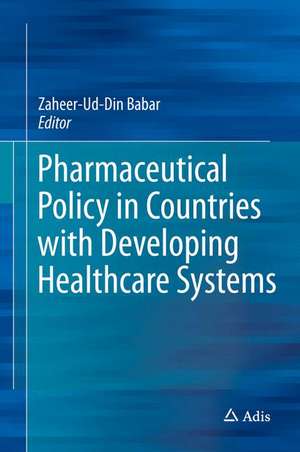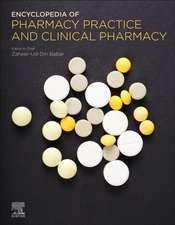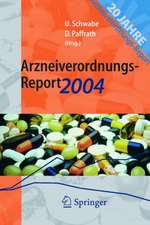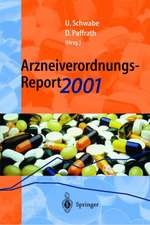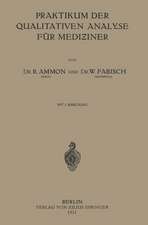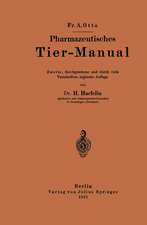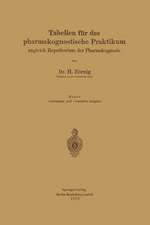Pharmaceutical Policy in Countries with Developing Healthcare Systems
Editat de Zaheer-Ud-Din Babaren Limba Engleză Hardback – 3 apr 2017
| Toate formatele și edițiile | Preț | Express |
|---|---|---|
| Paperback (1) | 1016.85 lei 38-44 zile | |
| Springer International Publishing – 20 iul 2018 | 1016.85 lei 38-44 zile | |
| Hardback (1) | 1019.41 lei 38-44 zile | |
| Springer International Publishing – 3 apr 2017 | 1019.41 lei 38-44 zile |
Preț: 1019.41 lei
Preț vechi: 1073.07 lei
-5% Nou
Puncte Express: 1529
Preț estimativ în valută:
195.05€ • 203.68$ • 161.08£
195.05€ • 203.68$ • 161.08£
Carte tipărită la comandă
Livrare economică 12-18 aprilie
Preluare comenzi: 021 569.72.76
Specificații
ISBN-13: 9783319516721
ISBN-10: 3319516728
Pagini: 424
Ilustrații: XII, 430 p. 36 illus., 33 illus. in color.
Dimensiuni: 155 x 235 x 31 mm
Greutate: 0.94 kg
Ediția:1st ed. 2017
Editura: Springer International Publishing
Colecția Adis
Locul publicării:Cham, Switzerland
ISBN-10: 3319516728
Pagini: 424
Ilustrații: XII, 430 p. 36 illus., 33 illus. in color.
Dimensiuni: 155 x 235 x 31 mm
Greutate: 0.94 kg
Ediția:1st ed. 2017
Editura: Springer International Publishing
Colecția Adis
Locul publicării:Cham, Switzerland
Cuprins
1. Introduction.- Section I: Low and Lower Middle Income Countries.- 2. Pharmaceutical Policy in the East African Community: Burundi, Kenya, Uganda, Rwanda, Tanzania.- 3. Pharmaceutical Policy in Pakistan.- 4. Pharmaceutical Policy in Philippines.- 5. Pharmaceutical Policy in Vietnam.- Section II: Upper Middle Income Countries.- 6. Pharmaceutical Policy in Argentina.- 7. Pharmaceutical Policy in Brazil.- 8. Pharmaceutical Policy In Bulgaria.- 9. Pharmaceutical Policy in China.- 10. Pharmaceutical Policy in Colombia.- 11. Pharmaceutical Policy in Ecuador.- 12. Pharmaceutical Policy in Jordan.- 13. Pharmaceutical Policy in Russia.- 14. Pharmaceutical Policy in South Africa.- Section III: High Income Countries.- 15. Pharmaceutical Policy in Poland.- 16. Pharmaceutical Policy in Saudi Arabia.- 17. Pharmaceutical Policy in Trinidad and Tobago.- 18. Pharmaceutical Policy in United Arab Emirates.- Section IV: Further Perspectives.- 19. ‘Repurposing’ Medicines: a Case for Low- and Middle-Income Countries with Developing Healthcare Systems.- 20. Pharmaceutical Policy in Countries with Developing Healthcare Systems: Synthesis of Country Case Studies.
Notă biografică
Zaheer-Ud-Din Babar is Professor in Medicines and Healthcare at the Department of Pharmacy, University of Huddersfield, United Kingdom.
He is globally recognized for his research in pharmaceutical policy and practice, including the quality use of medicines, clinical pharmacy practice, access to medicines and issues related to pharmacoeconomics. Previously he was the Head of Pharmacy Practice at School of Pharmacy, Faculty of Medical and Health Sciences, University of Auckland, New Zealand. A pharmacist by training and a Ph.D. in pharmacy practice, Dr. Babar is the recipient of prestigious “Research Excellence Award” from the University of Auckland.
He has active research collaborations and linkages in over 30 countries including in World’s leading Universities such as Boston University School of Public Health, Harvard Medical School, Austrian Health Institute, University of Auckland, Monash University and at the University of Sydney. He has published over 150 papers, book chapters, conference papers including in high impact journals such as PLoS Medicine and in Lancet Oncology. Dr. Babar has acted as an advisor for World Health Organization, Health Action International, the International Union Against Tuberculosis and Lung Disease, World Bank, International Pharmaceutical Federation (FIP) and for the Pharmaceutical Management Agency of New Zealand.
His recent work includes a number of high-quality books including "Economic evaluation of pharmacy services", ”Pharmaceutical prices in 21st century”, “ Pharmacy Practice Research Methods” and “Pharmaceutical policies in countries with developing healthcare systems. Published by Elsevier and Adis/Springer, the work is used in curriculum design, policy development and for referral all around the globe.
He is the Editor- in- Chief of Encyclopedia of Pharmacy Practice and Clinical Pharmacy, which is due to be published by Elsevier in early 2019.The Encyclopedia aims to cover multiple stream and domains including pharmacy practice, sociobehavioural, and administrative pharmacy, pharmacoepidemiology, clinical pharmacy and therapeutics and issues related to pharmacy education, professional standards, and workforce.
Professor Babar is also the Editor-in-Chief of BMC Journal of Pharmaceutical Policy and Practice and can be contacted at z.babar@hud.ac.uk
He is globally recognized for his research in pharmaceutical policy and practice, including the quality use of medicines, clinical pharmacy practice, access to medicines and issues related to pharmacoeconomics. Previously he was the Head of Pharmacy Practice at School of Pharmacy, Faculty of Medical and Health Sciences, University of Auckland, New Zealand. A pharmacist by training and a Ph.D. in pharmacy practice, Dr. Babar is the recipient of prestigious “Research Excellence Award” from the University of Auckland.
He has active research collaborations and linkages in over 30 countries including in World’s leading Universities such as Boston University School of Public Health, Harvard Medical School, Austrian Health Institute, University of Auckland, Monash University and at the University of Sydney. He has published over 150 papers, book chapters, conference papers including in high impact journals such as PLoS Medicine and in Lancet Oncology. Dr. Babar has acted as an advisor for World Health Organization, Health Action International, the International Union Against Tuberculosis and Lung Disease, World Bank, International Pharmaceutical Federation (FIP) and for the Pharmaceutical Management Agency of New Zealand.
His recent work includes a number of high-quality books including "Economic evaluation of pharmacy services", ”Pharmaceutical prices in 21st century”, “ Pharmacy Practice Research Methods” and “Pharmaceutical policies in countries with developing healthcare systems. Published by Elsevier and Adis/Springer, the work is used in curriculum design, policy development and for referral all around the globe.
He is the Editor- in- Chief of Encyclopedia of Pharmacy Practice and Clinical Pharmacy, which is due to be published by Elsevier in early 2019.The Encyclopedia aims to cover multiple stream and domains including pharmacy practice, sociobehavioural, and administrative pharmacy, pharmacoepidemiology, clinical pharmacy and therapeutics and issues related to pharmacy education, professional standards, and workforce.
Professor Babar is also the Editor-in-Chief of BMC Journal of Pharmaceutical Policy and Practice and can be contacted at z.babar@hud.ac.uk
Textul de pe ultima copertă
A comprehensive and granular insight into the challenges of promoting rational medicine, this book serves as an essential resource for health policy makers and researchers interested in national medicines policies. Country-specific chapters have a common format, beginning with an overview of the health system and regulatory and policy environments, before discussing the difficulties in maintaining a medicines supply system, challenges in ensuring access to affordable medicines and issues impacting on rational medicine use. Numerous case studies are also used to highlight key issues and each chapter concludes with country-specific solutions to the issues raised. Written by highly regarded academics, the book includes countries in Africa, Asia, Europe, the Middle East and South America.
Caracteristici
Comprehensive coverage of pharmaceutical policy research in over 15 markets
Numerous case studies to highlight policy issues
Key country-specific actions suggested for policy makers
Includes supplementary material: sn.pub/extras
Numerous case studies to highlight policy issues
Key country-specific actions suggested for policy makers
Includes supplementary material: sn.pub/extras
